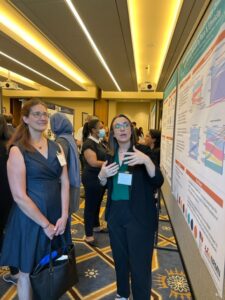Farewell conference features Institute for Health Disparities program
- July 27, 2023
- By: David Kallison
- Research
Related Links
 A variety of biomedical scientists descended upon Los Angeles last month, as well as scores more participating from home, for what would be the final National Institutes of Health Diversity Program Consortium annual conference. The theme was appropriately titled “Ending Well Together: Moving the Effort of the DPC Forward.” The event both celebrated the efforts and accomplishments of its grantees and focused on next steps for the programs under the DPC umbrella.
A variety of biomedical scientists descended upon Los Angeles last month, as well as scores more participating from home, for what would be the final National Institutes of Health Diversity Program Consortium annual conference. The theme was appropriately titled “Ending Well Together: Moving the Effort of the DPC Forward.” The event both celebrated the efforts and accomplishments of its grantees and focused on next steps for the programs under the DPC umbrella.
The National Research Mentor Network – Resource Center is one such program. It was created in partnership with The University of North Texas Health Science Center at Fort Worth’s Institute for Health Disparities, Vanderbilt University and UTHealth Houston.
“NRMN was born out of a need to address the diversity of the scientific workforce,” said Dr. Jamboor Vishwanatha, vice president of HSC’s Institute for Health Disparities. “Ultimately, NRMN addresses health disparities by equipping a diverse constituency of trained researchers who represent the population they serve. Through a robust online platform and strong member base, NRMN matches mentees with mentors from all 50 states and US territories, and helps facilitate those relationships, as well as provides courses and resources to support them.”
NRMN has grown to more than 27,000 members and fostered more than 7,800 connections. Its impact and mission to provide diverse researchers with evidence-based mentorship and professional development were on display at the final DPC conference. NRMN staff — including Principal Investigator Vishwanatha, Co-investigators Dr. Erika Thompson and Damaris Javier and PI of the Vanderbilt/UTHealth Houston sub-award Dr. Toufeeq Ahmed Syed — submitted three poster presentations for the conference, which focused on examining connections on the network by race and ethnicity, identifying career and education transition points via the platform and an overview of next steps for the network as a whole.
“I was amazed to see how NRMN has grown over the years, and I am excited to be a part of what’s next,” said Roda Cotanay, NRMN program manager. “Understanding that NRMN is part of a larger consortium like DPC has made it even more fulfilling. I will get to work with a group of professionals who are working to ensure that diverse people from different stages of their career have access to the resources they need to be successful.”
DPC was created in response to a 2011 study on race, ethnicity and NIH research awards, which found that Black scientists were “10 percentage points” less likely to be funded than applications from other groups. Supported by NIH Common Fund and administered by the National Institute of General Medical Sciences, the consortium implements programs that enhance the training and mentoring of biomedical students and faculty. Since its inception in 2014, the mentor network has played an important part in the life of the consortium.
While the DPC itself is moving on to a new phase, its work will echo throughout the field. As Dr. Alison Gammie, the director of the Division of Training, Workforce Development and Diversity at NIH, wrote in the conference’s program, “We remain optimistic that the important work of the DPC will be sustained and disseminated to the broader biomedical research enterprise.” The National Research Mentor Network stands as an important part of that legacy.






Social media